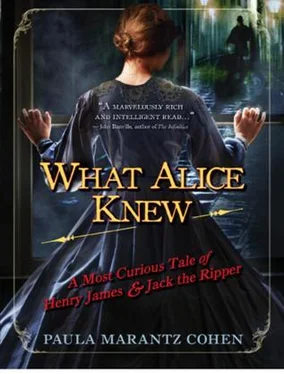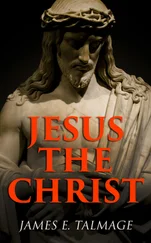“Most assuredly,” said Sickert. “All that carving up of the bodies. It’s clear something is being expressed.”
“Something sexual, you mean,” said Alice, interested in hearing Sickert elaborate.
“No, I wouldn’t say that. The murders do not seem to me sexual in nature. Creative, but not sexual.”
“You call murder creative?” asked Alice, surprised to hear her own views echoed so succinctly. “What do you mean?”
“All human beings are creative. They may not express their creativity as your brother and I do, by painting or writing, but they find an outlet in some form.”
“It puts me in mind of that De Quincey essay, you know,” said Henry casually, shooting a glance at his sister.
“Oh yes,” said Sickert. “‘Murder Considered as a Fine Art.’”
“I’m fond of De Quincey,” murmured Henry, “though I haven’t read everything.”
“I have a complete edition, given to me by a friend,” noted Sickert. “I’d be glad to lend it to you.”
Henry said he was grateful and would consider the offer.
“And how does someone who is bedridden express her creativity?” asked Alice returning to the original topic.
“With her illness, certainly,” said Sickert. “It takes a certain amount of creative energy to be sick.”
Alice laughed. “Precisely what I’ve always believed. Henry has explored it in his fiction. Some of his most interesting characters are sick. But William does not approve. He sees the invalid as someone who hasn’t exerted his will sufficiently. It’s the American Puritan in him,” added Alice. “His touchstones are spirituality, exertion, and restraint. He doesn’t approve of Henry and me.”
“Then he certainly wouldn’t approve of me,” noted Sickert.
William was seated in the public house off Whitechapel High Street waiting for Ella Abrams. He had arranged the meeting in order to interrogate her on the subject of her former lover. The thought made him twitch with repulsion, but he was determined to gather ammunition in his case against Walter Sickert. His brother and his sister had turned against him. Abberline was useless.
He had stopped in to see the inspector that morning and received the report of Abberline’s forgers on the subject of Sickert’s note. “They say there’s no proof that it wasn’t written by Jack the Ripper,” Abberline asserted, “but no reason to believe that it was .”
Under other circumstances, William would have accepted the verdict that the note was a potential piece of evidence that had come to nothing, but since his meeting with Ella Abrams in the shop, his attitude had changed dramatically. Suspicion of Sickert had hardened into conviction, and the note seemed to be irrefutable evidence. It was apparent to him now, for example, that the ink was the same ink used in the “Dear Boss” letter, that the r ’s were formed in precisely the same way, and that the flourish under the signature looked exactly like a line near the bottom of that notorious letter. He had made his case to Abberline, noting that the use of Pirie and Sons paper became significant in the context of the other factors. Surely, there was more than enough evidence on which to base an arrest.
Abberline had disagreed. “My forgers assure me there are no definitive points of resemblance,” he insisted, “and they are experts in these matters.”
“Experts!” William sneered. “They are criminals, not to be trusted!”
Abberline looked surprised at the vehemence with which his colleague spoke. “I assure you they are trustworthy in this arena at least. Honor among thieves and all that.”
William grew incensed by Abberline’s light tone. “They are protecting their own livelihood,” he spit out. “The longer they delay the resolution of this case, the better for them. It’s doubtless the same for you,” he added tersely. “You have you own interests to protect. Sickert is a man of standing in society…or at least he knows people of consequence. This keeps you from arresting him.”
Abberline drew back, surprised. He and William had spent many days together by then and had acquired some understanding of each other’s character. The accusation seemed to come out of nowhere. “I assure you I have no reason to protect my social superiors.” He spoke proudly. “I would be prone, if anything, to take the side of my own class over those above me. But I advocate only for justice. I will pursue a murderer, whatever his class, and will make an arrest when there is evidence to warrant one.”
William was hardly listening and instead continued arguing in the same line in which he had begun. “When you grow up in a society in which the privileged are protected, you are conditioned to follow suit.”
Abberline stared at his colleague. It was as though William had lost touch with reality and retreated into his own world. He spoke slowly, as if to a child. “I would be the first to arrest this man, were there evidence against him. But I see no evidence. Only a desire on your part that he be guilty.”
“A desire on my part?” exclaimed William. “And why would I have such a desire?” His voice had grown shrill.
“I have no idea what motivates you; only you are privy to that. I will continue to keep your Walter Sickert under watch, but will do no more without additional reason to suspect him.”
William had not argued further but had turned on his heel and left. He felt eaten away by anger and resentment, even as he knew, behind the turmoil of his emotions, that Abberline was right. Ella Abrams had once loved Walter Sickert. That fact fed an irrational, morally ignoble jealousy that undergirded his conviction of the man’s guilt. He knew this fact at the same time that he could not disentangle what he knew from what he felt.
As soon as he left Abberline’s office, he had sent a note to Connaught Square, requesting that Ella meet him that afternoon. Perhaps the evidence he craved lay with her, or perhaps he sensed that seeing her would assuage his agitation. She had immediately written back that she would meet with him in Whitechapel, as she had business in that area. She designated a public house and an hour at which she would be there.
He had arrived early, still smarting from his encounter with Abberline, but the place had a soothing effect on his nerves. The large downstairs room was practically empty and, unlike rowdier establishments in the neighborhood, was clean and quiet, with a comforting lack of distinctiveness. He could have been anywhere, in a limbo outside of time and place, where nothing he did mattered, where he would not be held to account for his actions. He chose a table toward the back and waited for her to come.
He had been waiting almost an hour when a figure in a cloak rose up before him, causing him to jump in alarm. He had been so engrossed in his own thoughts that seeing the cloaked figure had brought back the visceral terror of the attack the week before. But in a moment, Ella pushed back the hood and revealed her face. The relief and pleasure of seeing her was as great as the initial terror, merging into what he could only describe, based on his readings from some of the Germans, as a sense of the sublime. Her beauty dazzled him, made him feel literally dizzy with euphoric wonder, as it had on the two previous occasions when he had seen her.
“It’s good of you to go out of your way at such short notice,” he said, his voice sounding muffled and unnatural to his own ears.
Ella sat down and faced him. “It’s not out of my way,” she said. “I was delivering some canvases for framing to a shop nearby. And I wanted to meet you.”
She draped her cloak over her seat and looked at him with a frankness unusual for a woman. It occurred to him, seeing her here, how much she lived between worlds: rich and poor, Jewish and gentile, male and female, and he wondered if this fact wasn’t a large part of her fascination for him. He too lived between worlds, or had swung between them, if one considered the chaos of his younger life and the settled nature of his present one. And of course, he maintained oscillation in his work. He was constantly sliding out of one field and into another, finding he could not get a grip on the discipline as it existed and needing to reshape it in light of something else. Was the mark of a certain kind of character its inability to fit into the grooves that life had established, either because of happenstance of birth or temperament? Was this the nature of the philosopher and the artist—as well as the malcontent and the misfit?
Читать дальше












